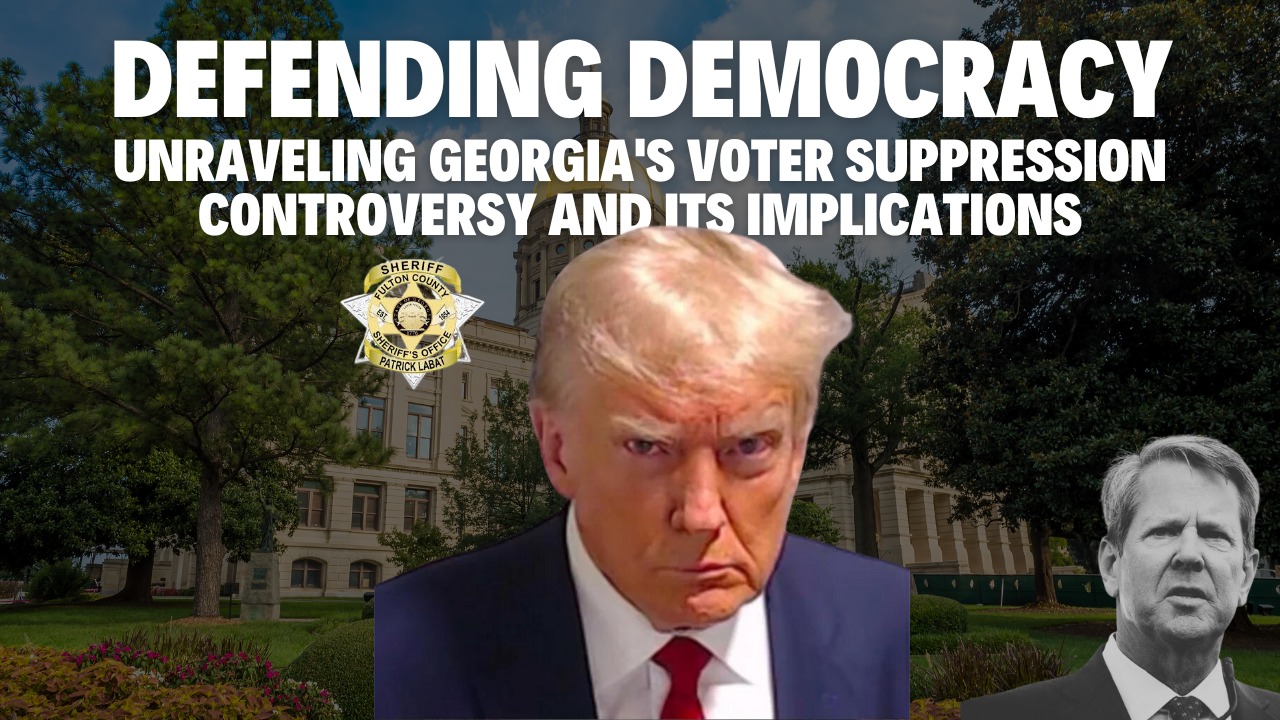Defending Democracy: Unraveling Georgia's Voter Suppression Controversy and Its Implications

Introduction: The Battle for Voter Rights in Georgia
Recently, the very essence of democracy – the right to vote – has been scrutinized in Georgia. A controversial voter suppression law, SB 202, has sparked debates, not just within the state but across the nation. This issue isn't just about a single law but its broader implications for American democracy.
Overview of the Controversy
The state of Georgia introduced a law that, on the surface, might seem benign to some. However, when delved into, it reveals measures that could hinder the voting process for many. One such step is banning food and water for voters waiting in line.
Significance in American Democracy
The right to vote is a cornerstone of American democracy. Any law or measure that potentially suppresses this right, directly or indirectly, challenges the foundation of the nation's democratic principles.
The Controversial Nature of the Voter Suppression Law
Georgia's voter suppression law has been a topic of heated debate, with many critics pointing out its potential to disenfranchise certain groups of voters.
Banning Basic Human Needs
One of the most talked-about aspects of this law is the ban on providing food and water to voters waiting in line. This isn't just about quenching thirst or satiating hunger; it's about the fundamental human rights of individuals exercising their democratic rights.
Underlying Implications
The ban may seem straightforward, but it carries more profound implications. Many might be discouraged by making the voting process more challenging and uncomfortable, especially in areas with longer wait times.
Tactics of Voter Suppression
Voter suppression isn't new, but the tactics employed can vary. Georgia's recent laws have brought to light some of these methods.
The Unpleasant Voting Experience
One of the primary tactics used in Georgia is creating an unpleasant voting experience. Making voters wait under the scorching Georgia sun without access to necessities like water becomes a civic duty and a test of endurance.
A Broader Trend Across States
Georgia isn't alone in its efforts. There's a growing trend of voter suppression efforts across various states. These efforts, whether overt or covert, aim to limit access to voting, especially for specific communities that might already face challenges in casting their votes.
The Omnibus Voter Suppression Law: A Deep Dive
Georgia's Omnibus voter suppression law is multi-faceted, with several components that have raised concerns among voting rights advocates.
New Identification Requirements
One of the standout features of this law is the introduction of new identification requirements for absentee voting. While the argument for such measures is often framed around preventing voter fraud, critics argue that it can disproportionately affect certain groups, making it harder for them to vote.
Restrictions on Voting Accessibility
The law also restricts the use of dropboxes and mobile polling places. These measures can impact voter access, especially in densely populated areas, leading to longer lines and wait times at polling stations.
The Domino Effect: Long Voting Lines
With the restrictions above in place, one of the direct consequences is the prolongation of voting lines. Longer lines can deter voters, especially those who can't afford to wait for hours, further suppressing the voter turnout.
Disproportionate Effects on Communities
The impact of voter suppression laws isn't uniform. Specific communities bear the brunt more than others, revealing systemic issues in the electoral process.
The Challenge of Long Lines
While waiting in line might seem like a minor inconvenience to some, it's a significant barrier for many, especially in marginalized communities. Long lines in elections can mean taking time off work, arranging childcare, or enduring health risks, making it a deterrent for many potential voters.
Targeting Black Voters
The ban on providing food and water to those waiting in line has been criticized as a deliberate attempt to suppress black voters. Historically, areas with more black voters have seen longer wait times. The ban, therefore, disproportionately affects these communities, as shorter wait times in predominantly white areas make such provisions less critical.
Comparing Georgia and Alabama: A Pattern Emerges
Looking beyond state borders is crucial to identifying patterns and commonalities when examining voter suppression efforts.
Similar Tactics Across States
Both Georgia and Alabama have showcased similar voter suppression tactics. This raises questions about whether a coordinated effort or playbook is being followed to disenfranchise voters in multiple states.
Potential Violations of Court Orders
The similarities between the two states don't just stop at tactics. There are rising concerns about Republicans potentially violating court orders related to voting rights. If proven true, such actions can have significant legal and political repercussions.
Potential Consequences for Republicans in Georgia
The voter suppression efforts in Georgia have not gone unnoticed, and there might be legal consequences on the horizon.
Legal Scrutiny of the Maps
One of the significant points of contention is the redrawing of electoral maps. There's an expectation that the trial court might strike down these maps for violating the law. Such a decision could profoundly impact future elections in the state.
Creation of an Additional District
If the maps are struck down, an additional African-American district might be created outside Atlanta. This could significantly alter the political landscape and representation in the state.
Conclusion: Upholding the Pillars of Democracy
The saga of voter suppression in Georgia is more than just a state issue; it's a reflection of the challenges faced by American democracy.
The Importance of Vigilance
As citizens, it's crucial to remain vigilant and informed about any measures that might infringe upon our democratic rights. The events in Georgia remind us of the lengths to which some might go to suppress votes and our collective responsibility to counter such efforts.
A Victory for Georgia Voters
Despite the challenges, the pushback against these suppression efforts signifies a victory for Georgia voters. It's a testament to the resilience of the democratic spirit and the potential for positive change when citizens unite for a common cause.